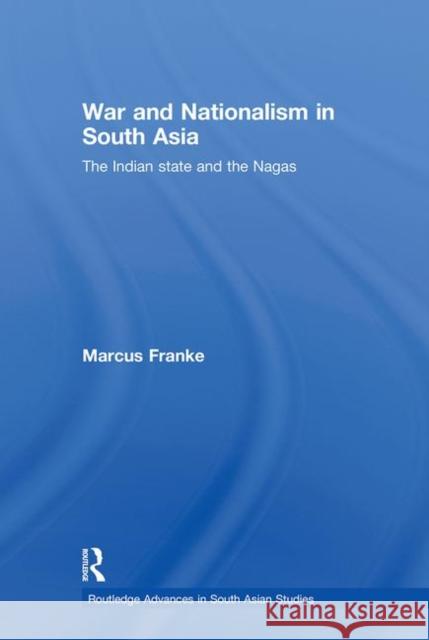War and Nationalism in South Asia: The Indian State and the Nagas » książka
War and Nationalism in South Asia: The Indian State and the Nagas
ISBN-13: 9780415437417 / Angielski / Twarda / 2008 / 224 str.
War and Nationalism in South Asia: The Indian State and the Nagas
ISBN-13: 9780415437417 / Angielski / Twarda / 2008 / 224 str.
(netto: 469,25 VAT: 5%)
Najniższa cena z 30 dni: 478,50 zł
ok. 16-18 dni roboczych.
Darmowa dostawa!
This book presents and analyses the oldest sub-national war of postcolonial South Asia, between the Indian state and the Nagas of Northeast India. It offers a serious and thorough political history on the Naga region over three periods, pre-colonial, colonial, and post-colonial. Drawing on a wealth of primary sources and comparative and theoretical literature, Marcus Franke demonstrates that agency and identity-formation are an on-going process that neither started nor ended with colonialism. Although the interaction of the local population with colonialism produced a Naga national elite, it was the emergence of the Indian political class, with access to superior means of nation and state-building, that was able to undertake the modern Indo-Naga war. This war firmly made the Nagas into a 'nation' and that set them onto the road to independence. War and Nationalism in South Asia fundamentally revises our understanding of the existing 'histories' of the Nagas by exposing them to be influenced by colonial or post-colonial narratives of domination. Furthermore, by placing the region into the longue duree of state formation with its involved technique of imperial rule, the book presents a new approach to the study of nationalism and war in South Asia in general. This book will be of interest to students and scholars of politics, history, anthropology and South Asian studies.
This book presents and analyzes the oldest sub-national war of postcolonial South Asia, the one between the Indian state and the Nagas of Northeast India.
By way of a historical analysis, Marcus Franke demonstrates that agency and identity-formation are an on-going process that neither started nor ended with colonialism. Although the interaction of the local population with colonialism produced a Naga national élite, it was the Indian political class that came into existence, the same way it succeeded in having access to superior means of nation and state-building, that enabled it to undertake the modern Indo-Naga war. It was this war that firmly made the Nagas into a 'nation' – setting them onto the road to independence.
War and Nationalism in South Asia fundamentally revises our understanding of the existing 'histories' of the Nagas by exposing them as historical - consciously or unconsciously – influenced by colonial or post-colonial narratives of domination. Furthermore, it gives a new approach to the study of nationalism and war in South Asia in general, by placing it into the longue durée of state formation with its involved technique of imperial rule.











